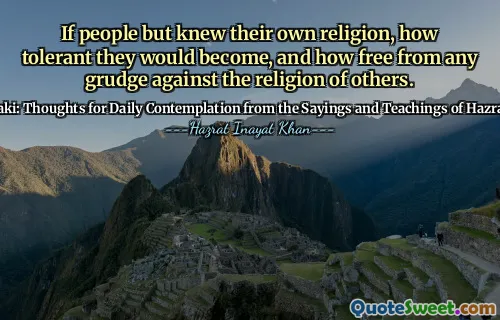
If people but knew their own religion, how tolerant they would become, and how free from any grudge against the religion of others.
This quote from ---Hazrat Inayat Khan--- offers a profound insight into the nature of religious understanding and empathy. It suggests that ignorance, even of one's own faith, can be a source of intolerance and prejudice. When individuals lack a deep and authentic knowledge of their religion, they are more likely to cling rigidly to superficial or dogmatic interpretations, which can fuel fear, suspicion, and animosity towards others with different beliefs.
On the other hand, true knowledge and comprehension of one's faith often unveil the common spiritual and moral foundations shared among different religions. This awareness fosters tolerance because it highlights that the essence of religion is not division but connection, love, and respect for others. When people embody the true spirit of their religion, they naturally become free from grudges or ill will towards those who follow different paths.
Moreover, this idea extends beyond religion to broader human interactions. It points to the fundamental role of self-awareness and education in overcoming prejudice. When we deeply understand our own identity—be it religious, cultural, or personal—we become less defensive and more open to appreciating others. This is especially important in a world marked by social and religious pluralism, where coexistence requires not just superficial acceptance but genuine empathy.
In practical terms, this quote encourages individuals to engage in thoughtful study and introspection about their beliefs, rather than adopting inherited or societal biases. It invites us to move past stereotypical labels and embrace a spirituality that unites rather than divides. Such an approach not only enriches personal faith but also builds bridges across communities, contributing to peace and harmony.
In essence, Hazrat Inayat Khan reminds us that tolerance and freedom from grudges emerge not from merely tolerating differences grudgingly but from the enlightened understanding of our own faith’s true nature. This insight offers hope for a more compassionate and harmonious world where religious differences are seen not as threats but as diverse expressions of the same universal truth.


